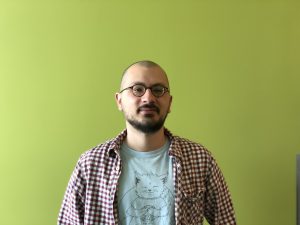UMass Linguistics is well-represented at the 24th Massachusetts Statewide Undergraduate Research Conference, Friday 4/27 in our very own Campus Center, with three majors presenting their research.
At the 8:30am-9:15am session in room 917, Vishal Sunil Arvindam will present a 15-minute talk entitled “An Eye-Tracking Investigation into the Processing of Stereotypical Gender and the Singular “They” Using Reflexives”, advised by Brian Dillon.
At the 11:45am-12:30pm session on ePoster board #53, Valerie Anita Higgins will present a poster entitled “¿Me Entiendes?: A Study on Prosodic Acquisition by American L2 Learners of Spanish”, advised by Kristine Yu.
And at the 3:30pm-4:15pm session in room 163, John Duff will present a 15-minute talk entitled “Somebody’s Fool: Accommodating Perspective Shifts”, advised by Lyn Frazier.
Visit the conference website for more details, and the full program and abstracts for this year’s conference, including other presentations of language-related research from undergraduates across MA. Abstracts for the three UMass linguists’ research are printed below.
Vishal Sunil Arvindam, “An Eye-Tracking Investigation into the Processing of Stereotypical Gender and the Singular “They” Using Reflexives”
The purpose of the thesis is two-fold: 1. To investigate the precise nature of stereotypical gender inferences using a computational model. 2. To assess the viability of the ‘themselves’ as the reflexive form of the singular ‘they’. Research across methodologies has shown that stereotypically gendered antecedents (e.g. nurse) that are definitionally neutral are not treated as such online. That is, people generally having a harder time reading masculine pronouns following a noun like nurse than they do with feminine pronouns. Alternatively, research has shown that the singular they pronoun is harder to process following stereotypically gendered nouns than gender known nouns. This counterintuitive finding motivated this study, particularly the not well understudied interaction between gender stereotypical and gender-known nouns and the singular they. To probe this interaction, I am currently running a 2×3 eyetracking study using items in (1) and (2) that contrast stereotypical with known gender antecedents followed by syntactically bound reflexive pronouns. 1. The soldier camouflaged [himself/herself/themselves] carefully to hide from the enemy during battle. 2. The boy hid [himself/herself/themselves] stealthily while playing hide and seek. I am testing the hypothesis that stereotypical gender is probabilistic. That is, certain stereotypical nouns are more likely to be of a certain gender and this, in turn, impacts the processing of gendered and gender neutral reflexives. To test the hypothesis, I have formulated a computational model that accounts for these probabilities and produces a metric (“surprisal”) that quantitatively predicts reading difficulty at the pronoun.
Valerie Anita Higgins, “¿Me Entiendes?: A Study on Prosodic Acquisition by American L2 Learners of Spanish”
In this study, we focus on second language prosodic acquisition, in this case, the ability of American English speakers learning Spanish to acquire the speech melody of their second language, a characteristically tricky aspect of second language learning. Specifically, we aim to discover: (1) if advanced learners studying in Oviedo, Spain sound more native to native Spanish speakers than intermediate learners studying in the US, and (2) how that nativeness rating relates to the learner’s mastery of Spanish prosody. Preliminary results indicate that both learner groups are understood to about the same degree by Spaniards. Based on the hypothesis that advanced speakers will be more native-sounding to natives, we constructed an online survey in which native, advanced, and intermediate level speakers listened to question-answer pairs whose speech melody matched or mis-matched in the type of stress (normal declarative — Maria took a drink– or corrective emphasis — No, Maria took a drink) employed by the speaker. As such, a match could be a declarative-declarative, and a mis-match a contrastive-declarative pair. Using participant responses (native or nonnative), the true acceptability of the pair (match or mis-match), and the language level of the audio’s speaker, we categorized the success of that listener’s prosodic assimilation. Our work is one of the first in the field to employ American English speakers learning a second language, and highlights the crucial relationship between prosody and learner-native intelligibility.
John Duff, “Somebody’s Fool: Accommodating Perspective Shifts”
Epithets, like “that jerk”, express the attitude of a judge toward their referent. This judge is typically the speaker of the utterance. However, shifted interpretations with a non-speaker judge have been observed in certain contexts, including inside and outside of embedding under speech and thought. I present interpretation experiments demonstrating that the presence of speech and mental predicates in a preceding sentence increases availability of non-embedded shifted readings. The evidence further indicates that mental predicates most strongly promote shifts, contradicting the speech-centered predictions of accounts which rely on context-shifting operators in the grammar. Instead, I consider a new pragmatic explanation where many factors in a discourse, including but not limited to speech and mental predicates, can systematically promote shifted interpretations. In addition, I suggest a close relationship between these interpretations and cognitive representations within language-independent Theory of Mind systems in the brain. In sum, the results dispel possible grammar-internal explanations for shifted interpretations of epithets, and suggest that these readings are instead the result of general pragmatic decoding, influenced by a vested human interest in others’ mental states.










